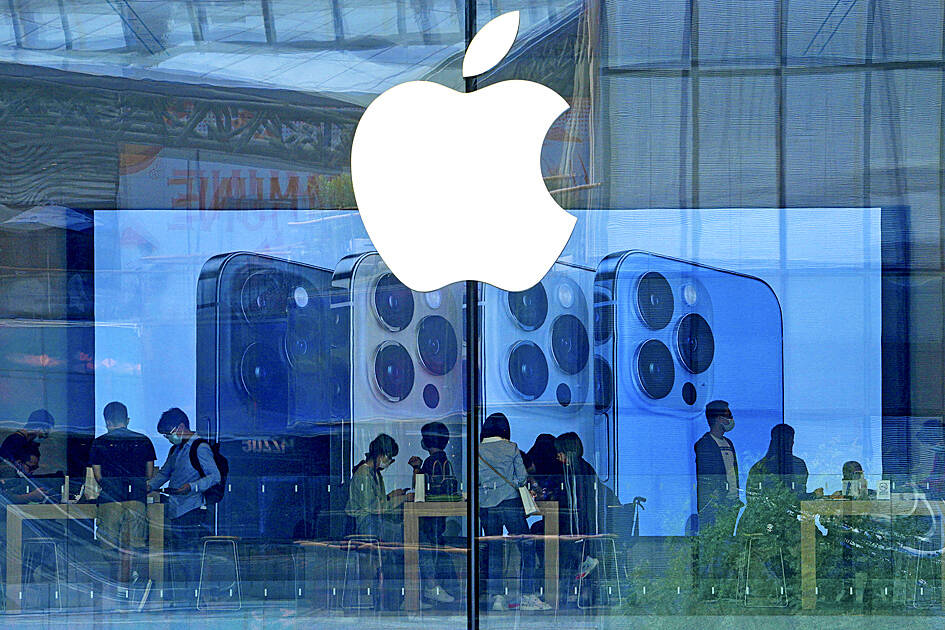Apple’s smartphone shipments in China shrank 2.1 percent in the final quarter of last year from the same period in the previous year, hurt by intensifying competition from local rivals led by Huawei Technologies Co (華為), data from research firm IDC showed yesterday.
The drop underscores the challenges facing the US firm in its third-biggest market, as some Chinese companies and government agencies limit employees’ use of Apple devices, a measure that mirrors US government restrictions on Chinese apps on security grounds.
Huawei, whose smartphone business was stymied by US sanctions, also made a comeback last year with new launches, intensifying competition in the world’s biggest smartphone market, which grew just 1.2 percent in the final quarter of last year.

Photo: AP
Huawei’s shipments increased 36.2 percent last quarter, the IDC figures showed. The company became the fourth largest smartphone vendor in China in the
period with a 13.9 percent market share, up from 10.3 percent in the same year-ago quarter.
However, for the full year last year, Apple overtook Vivo to become the top smartphone seller with a 17.3 percent market share, the IDC data showed.
This marked the first time Apple became the top seller in China, but analysts predicted its sales would come under pressure again this year.
IDC said Apple’s high-end market share in China has been impacted by rival products and limited product upgrades by Apple, which reduced the overall attractiveness of iPhones.
It said Apple still attracted demand from many consumers through substantial discounts and promotions carried out through third-party distribution channels.
Earlier this month, Apple offered rare discounts on its iPhones, cutting retail prices by as much as 500 yuan (US$70) amid growing competitive pressure.
Jefferies analysts earlier this month predicted that Apple’s shipment volumes would continue declining by double-digit percentages this year, while Huawei is seen bolstering its market share.
They estimate Huawei would ship about 64 million smartphones worldwide this year, a significant rise from fewer than 35 million units projected for last year.
Overall, shipment volume in China’s smartphone market was 73.63 million units in the fourth quarter. For the full year, shipment volume was 271 million units, down 5 percent, IDC said.

Intel Corp chief executive officer Lip-Bu Tan (陳立武) is expected to meet with Taiwanese suppliers next month in conjunction with the opening of the Computex Taipei trade show, supply chain sources said on Monday. The visit, the first for Tan to Taiwan since assuming his new post last month, would be aimed at enhancing Intel’s ties with suppliers in Taiwan as he attempts to help turn around the struggling US chipmaker, the sources said. Tan is to hold a banquet to celebrate Intel’s 40-year presence in Taiwan before Computex opens on May 20 and invite dozens of Taiwanese suppliers to exchange views

Application-specific integrated circuit designer Faraday Technology Corp (智原) yesterday said that although revenue this quarter would decline 30 percent from last quarter, it retained its full-year forecast of revenue growth of 100 percent. The company attributed the quarterly drop to a slowdown in customers’ production of chips using Faraday’s advanced packaging technology. The company is still confident about its revenue growth this year, given its strong “design-win” — or the projects it won to help customers design their chips, Faraday president Steve Wang (王國雍) told an online earnings conference. “The design-win this year is better than we expected. We believe we will win

Chizuko Kimura has become the first female sushi chef in the world to win a Michelin star, fulfilling a promise she made to her dying husband to continue his legacy. The 54-year-old Japanese chef regained the Michelin star her late husband, Shunei Kimura, won three years ago for their Sushi Shunei restaurant in Paris. For Shunei Kimura, the star was a dream come true. However, the joy was short-lived. He died from cancer just three months later in June 2022. He was 65. The following year, the restaurant in the heart of Montmartre lost its star rating. Chizuko Kimura insisted that the new star is still down

While China’s leaders use their economic and political might to fight US President Donald Trump’s trade war “to the end,” its army of social media soldiers are embarking on a more humorous campaign online. Trump’s tariff blitz has seen Washington and Beijing impose eye-watering duties on imports from the other, fanning a standoff between the economic superpowers that has sparked global recession fears and sent markets into a tailspin. Trump says his policy is a response to years of being “ripped off” by other countries and aims to bring manufacturing to the US, forcing companies to employ US workers. However, China’s online warriors